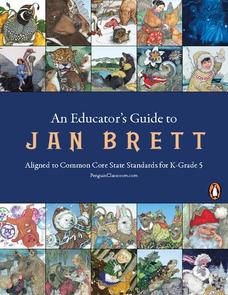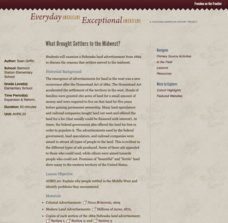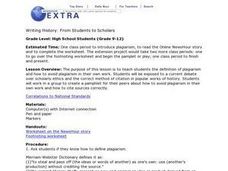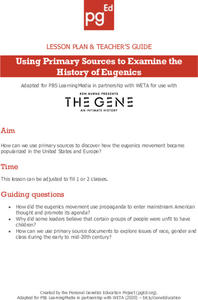Ford's Theatre
How Perspective Shapes Understanding of History
The Boston Massacre may be an iconic event in American history, but perhaps the British soldiers had another point of view. Using primary sources, including reports from Boston newspapers and secondary sources from the British...
EngageNY
Grade 9 ELA Module 3, Unit 3, Lesson 3
Plagiarism is the theft of intellectual property. To avoid this crime, class members learn how to create a works cited page and how to craft in-text citations. After examining a high-performance model paragraph and an example of a works...
Center for Mathematics and Technology
Whole Numbers: Using an Area Model to Explain Multiplication
There are many ways to work through a multiplication problem. Using an area model, kids complete several worksheets with different types of multiplication problems, including multiplying by ten, and explain how the new strategies differ...
Penguin Books
An Educator's Guide to Jan Brett
Prepare to teach Jan Brett stories by taking a look at this teacher resource, which includes text-based questions, writing assignments, discussion ideas, and vocabulary practice for 18 different stories.
New Hampshire Bureau of Adult Education
Dystopian Literature: from Fiction to Fact
Imagine an entire course devoted to dystopian literature. If that concept appeals to you, check out this course that uses 1984 as the anchor text and includes classic short stories as well.
EngageNY
Analyzing the Structure and Content of an Essay to Inform
Outlines are a great asset to essay planning. Scholars read and analyze a model essay about the importance of daily reading and consider how it would look in an outline format. Next, they outline their own informative essays about rules...
Curated OER
I.C.E. - Cite Sources Like a Pro
Here is a fantastic poster that you can easily and frequently reference in your class whenever you are asking your young writers to cite their sources. Using the acronym ICE, learners are reminded to introduce, cite, and explain their...
Curated OER
Citing Sources
Fifth graders demonstrate how to cite sources when writing a research paper. In this research writing lesson, 5th graders view a demonstration on how to cite sources using an included graphic organizer. Students practice citing sources...
EngageNY
Solve for Unknown Angles—Transversals
Lead your class on an exciting journey through the world of math as they review geometry facts and solve for unknown angles. They learn how to use auxiliary lines and congruent angles to correctly complete each practice problem...
Curated OER
Those Baffling Bibliographies!
Are you working on a research and citation unit? Have your young writers listen to a lecture on how to cite research sources correctly and how to distinguish new information that requires citing. They compile a list of works cited from...
Roy Rosenzweig Center for History and New Media
What Brought Settlers to the Midwest?
Drawn by promises of fertile land, thousands of settlers poured West because of the Homestead Act of 1862. By examining images of the ads that drew them westward, learners consider the motivations for movement. They also consider how the...
Walters Art Museum
The Symbolism of Allegorical Art
Introduce learners to allegorical art with four bronze sculptures by Francesco Bertos. After modeling how to recognize bias and allegory in Bertos' Africa, class groups examine the other three sculptures in the series before creating...
Curated OER
MLA Bibliography Worksheet
Help your class remember how to cite different sources. Reviewed on this two-page document are books, articles from a database, articles from a magazine, and websites. Examples are provided, and learners use the charts to fill in the...
Curated OER
Plagiarism: Avoiding Accidental Internet Plagiarism
Demonstrate how to cite information from Internet sources without plagiarizing. If your class is working on an Internet research paper, and you have observed learners cutting and pasting directly from the Internet, the activities and...
K12 Reader
Analyzing O! Pioneers
Readers of O! Pioneers are asked to cite evidence from a paragraph of Willa Cather's novel to support an analysis of Alexandra Bergson, the personal qualities she possesses, and how these qualities will help the Bergson family after her...
K12 Reader
Setting the Scene: Great Expectations
Expect great things from this reading comprehension exercise that asks readers to cite evidence from the provided passages of Great Expectations to support the inference that Charles Dickens' Miss Havisham, and her room, are indeed strange.
Baruch College Writing Center
Summarizing, Paraphrasing, and Quoting Workshop
What's the difference between summarizing and paraphrasing? Show class members how to find the main ideas from informational text and condense it, restate it, or quote it directly with a series of educational activities based on two...
National Science Teachers Association
The Ethanol Project
In a mock senate hearing regarding the development of ethanol as a fuel source, each person in the class is assigned a role to play and must uphold the stance of their character. Once the senate hearing is complete, each person writes a...
Curated OER
Writing History: From Students to Scholars
An Online NewsHour article about scholarly ethics launches this study of plagiarism. Since historians are supposed to bring original ideas and perspectives to their publications, they must give credit to the ideas of others. After a...
NOAA
I Can't Breathe!
The Gulf of Mexico dead zone, an area of low oxygen that kills marine life, costs the United States $82 million every year. Young scientists research anoxic ocean environments then come up with a hypothesis for the cause of the Gulf of...
Curated OER
Socratic Seminar Questions/Observation
Prepare participants for a Socratic seminar by asking them to not only design questions for the discussion, but to also observe an assigned partner during the seminar. A great way to encourage student-led discussions.
Weber State University
Quoting, Paraphrasing, & Summarizing
Tattoos and piercings. Here’s a PowerPoint that uses an article on the tattoo and piercing craze to engage viewers in a presentation about citing sources. The 14 slides focus on how to add credibility to writing by including and citing...
EngageNY
Identifying How Text Features Support Arguments: “The Exterminator"
Half and half. Split the class in half to gain a full understanding of sidebars. Pupils work in groups to discuss sidebars in text. Half of the groups read Seriously Sick, and the other half reads Killer Genes. They read using...
Personal Genetics Education Project
Using Primary Sources to Examine the History of Eugenics
Eugenics philosophy takes survival of the fittest to a whole new level. With a research-focused lesson, young scientists examine the history of the eugenics movement and its impact on society. Pupils engage with a video clip, primary...
Other popular searches
- How to Cite Sources
- How to Cite Websites
- How to Cite Notecards
- How to Cite Quotations
- How to Cite Note Cards

























